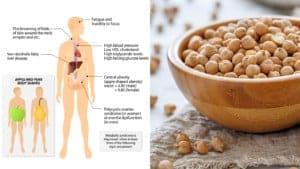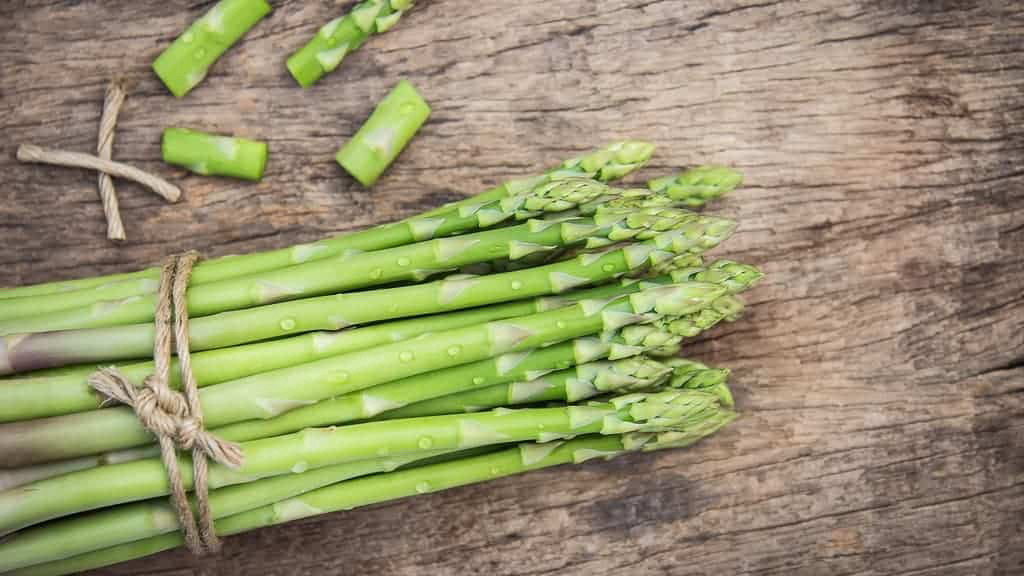Although less understood than their famous cousin, probiotics, prebiotics are just as crucial to a healthy digestive system. Thus, prebiotic foods come to the forefront for making your internal food processing system into a well-tuned instrument, providing your whole body with optimal nutritional support.
Prebiotics are the food source of probiotics. They are an indigestible fiber that becomes food for the good bacteria in your GI tract. And the more healthy your microbiome, the more efficient the delivery of needed nutrients to every part of your body.
So what are the best foods for providing needed prebiotics for your digestive system? Here is a list of 18 that experts agree can offer some high-quality, yummy fiber for friendly gut bacteria.
18 Foods That Are Effective Prebiotics
1. Chicory Root
Chicory root has been historically favored for its coffee-like flavor. It contains the prebiotic fiber inulin, an excellent source of gut nourishment.
Moreover, chicory root fiber can prevent constipation, improve fat digestion by increasing bile production, and help detox the liver through its high antioxidant content. The ground root is often a significant ingredient in prebiotic supplements.
2. Dandelion Greens
These incredibly healthy greens have plenty of inulin fiber for gut health, along with immune-system boosting nutrients. Dandelion greens contain antioxidant contents. Additionally, they provide anti-inflammatory, anti-cancer, diuretic, and cholesterol-lowering effects.
Add nutritional fiber content to salads, sandwiches, soup, or herbal tea with this ubiquitous natural herb. The greens are best when harvested in early spring. The leaves gain an acrid taste over time that can be lessened by blanching.
3. Jerusalem Artichokes
The Jerusalem artichoke’s name is quite a misnomer. So don’t be surprised if you have no idea what it is. Sometimes called “earth apples,” this sunflower relative is native to North America, and the root has been eaten medicinally for centuries. Some studies indicate the raw or cooked tubers increase friendly gut bacteria even better than chicory root.
The root has also been found to be an effective immune system booster and preventer of metabolic disorders. Plus, the tuber’s high thiamin and potassium content help support the nervous system and maintain muscle function.
4. Garlic
Garlic is probably one of the most-eaten herbs. It contains several prebiotic fibers, including inulin and fructooligosaccharides (FOS). These fibers especially support the growth of beneficial Bifidobacteria while preventing the growth of harmful, disease-promoting bacteria.
Garlic also contains manganese, Vitamin B6, and selenium. These nutrients add to the herb’s antioxidant, antimicrobial, and cancer-fighting effects. This delicious herb is easy to add to a plethora of dishes to help maintain overall health.
5. Onions
Onions are an excellent source of inulin and FOS fiber. These fibers help aid digestion and the breakdown of fat and boost the immune system. Onions help prevent the growth of undesirable gut bacteria, giving them antibiotic and antioxidant properties.
Flavanoids, vitamins, and minerals in onions help support your cardiovascular system and reduce your risk of cancer. And there is a variety of choices in the onion family, making them easy to add to either raw or cooked dishes.
6. Leeks
Garlic, onions, and leeks are all in the same plant family and carry similar health rewards. Leeks are a sweeter version of onion and can easily be added to many foods, though eating them raw has the greatest benefits.
Leeks are rich in prebiotic inulin fiber for gut health and flavonoids to help fight cell oxidation. They contain anti-cancer properties, vitamin K for strong bones, and vitamin B6 for a healthy heart.
7. Asparagus
Asparagus is a popular vegetable with a high inulin fiber content. This prebiotic fiber promotes the growth of friendly bacteria in the digestive system. Studies show asparagus is an excellent detoxifier for the liver.
The combination of gut-friendly fiber and antioxidants in asparagus provides an anti-inflammatory effect. Try adding it raw to a salad or smoothie to reap the maximum raw foods benefits.
8. Apples
Much of the apple’s prebiotic fiber content is pectin. Pectin increases the production of certain fatty-acids that feed your beneficial gut bacteria while limiting harmful bacteria. Apples are so chock-full of pectin, antioxidants, and polyphenols that eating at least one per day can improve digestive health, boost metabolism, and decrease bad cholesterol.
Studies link the polyphenols and pectin in apples with reduced risk of lung and colon cancer. Since the type of apple you choose makes a difference, you may want to research before your purchase. And yeah, you’ll have to eat the peel to get the full benefits.
9. Bananas
Bananas are one of the most-purchased foods in America. Additionally, bananas are rich in vitamins, minerals, and inulin fiber, shown to increase good bacteria and reduce bloating.
Also, if you like your bananas a little on the unripe side, all the better. That’s because they are high in a kind of resistant starch that also has prebiotic properties. The prebiotic fiber plus natural potassium content can also improve muscle relaxation, another reason for their popularity.
10. Wheat Bran
Wheat bran contains a unique type of prebiotics, arabinoxylan oligosaccharides (AXOS). AXOS fiber boosts healthy Bifidobacteria while impeding the growth of unhealthy bacteria in the gut.
Wheat bran decreases GI distress, such as cramping, abdominal pain, and flatulence. Furthermore, whole grains rich in AXOS also contain antioxidant and anti-cancer properties.
11. Oats
Whole oats are loaded with beta-glucan along with some resistant starch for excellent prebiotics benefits. They’re one of the most popular foods for helping to lower LDL cholesterol and to control blood sugar levels.
Beta-glucan promotes healthy gut bacteria and slows digestion for better appetite control. Plus, it has antioxidant and anti-inflammatory properties and may reduce certain cancer risks. Whole oats are the best source for full benefits.
12. Barley
This popular cereal grain is also an excellent source of beta-glucan, promoting healthy gut biota. Like oats, barley has been shown to reduce both bad cholesterol and blood sugar levels.
The selenium content of barley supports healthy thyroid function. This whole grain also contains antioxidants and immune system boosting properties. It may even help you lose weight.
13. Chickpeas
Many legumes are rich in prebiotic fiber content. Chickpeas are just one of these foods that can help increase your prebiotic intake. They are also rich in protein, iron, potassium, and B vitamins.
Other legume choices include lentils, red kidney beans, and soybeans. Of course, these foods all promote healthy gut bacteria and a strong immune system.
 14. Jicama Root
14. Jicama Root
Jicama is a starchy root vegetable with a slightly sweet taste. It’s high in inulin fiber for improved GI health. Thus, the root helps prevent diabetes by aiding the absorption of insulin.
Jicama contains a balance of amino acids that can prevent or treat constipation and promote regular bowel movements. In addition, it’s high in vitamin C for a strong immune system and also supports heart health.
15. Flaxseeds
Flaxseeds have become recognized as a superfood. They are loaded with fiber to aid digestion and GI health. They are popular in fitness circles as a source of macronutrients such as manganese and B vitamins, along with a fair amount of protein.
Flax contains omega-3 fatty acids for heart and brain health and lignans for cancer prevention. Raw flax can be added to salads, cereal, or smoothies on a daily basis to promote overall health and digestive balance.
16. Cocoa
Yes, there are some very good reasons to eat chocolate, and intestinal health is one of them. That’s because the flavonols in cocoa have powerful prebiotic properties that promote healthy gut bacteria growth and decrease stress hormones there.
As cocoa beans break down, they also produce nitric oxide, which has beneficial effects on the cardiovascular system and prebiotic compounds that discourage unwanted bacteria growth that could lead to infections.
17. Savoy cabbage
Like many green, leafy veggies, cabbage is loaded with beneficial vitamins and minerals, as well as insoluble and soluble fiber. Soluble fiber is prebiotic and is an important fuel source for friendly gut bacteria such as Bifidobacteria and Lactobacilli.
These bacteria protect the immune system and aid in the production of important nutrients such as vitamins K2 and B12. Also, cabbage is an easy, affordable way to add prebiotic benefits to your diet.
18. Yacon Root
Yacon root is very similar to sweet potatoes and is rich in prebiotic FOS fiber and inulin. The South American root is often made into syrup for a nutritious low-sugar alternative. Because the syrup has the consistency of molasses, it’s great as a syrup substitute in smoothies.
Yacon encourages healthy gut bacteria growth, reduces constipation, improves mineral absorption, helps regulate blood fats, and supports a healthy immune system.
 Final Thoughts on Eating Prebiotic Foods
Final Thoughts on Eating Prebiotic Foods
Ongoing research continues revealing the importance of prebiotics to gut health. Dietary fiber is easy to add to an everyday diet with astronomical benefits. Moreover, a well-balanced GI tract affects the health of your whole body, from your brain to your heart to your skin.
It’s important to consider the prebiotics present in the foods you choose to eat. So for the sake of your whole-body and mental health, you need to meet this important dietary requirement on a daily basis.

















